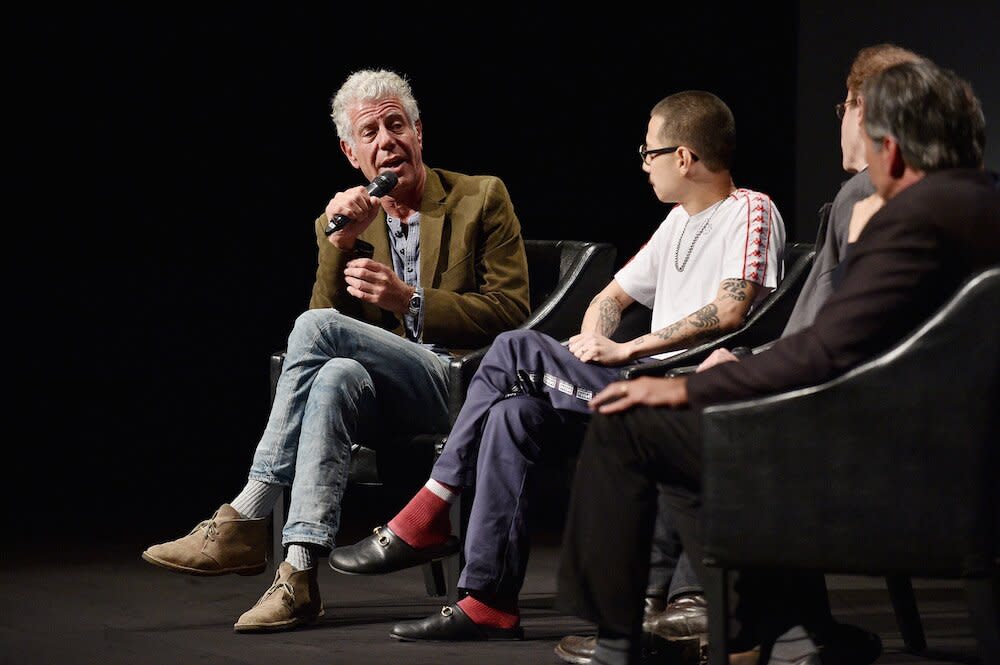Why Anthony Bourdain Thinks Chefs Are Qualified To Lead the Fight Against Food Waste

- Oops!Something went wrong.Please try again later.
- Oops!Something went wrong.Please try again later.
- Oops!Something went wrong.Please try again later.
On Saturday afternoon, the documentary Wasted! The Story of Food Waste premiered at the Tribeca Film Festival. Executive produced by Anthony Bourdain, the film addresses the world's food waste problem—one third of all food grown globally is being wasted—and offers potential solutions from a chef's perspective. Pioneering chefs Dan Barber, Mario Batali, Massimo Bottura and Danny Bowien explore how they're changing the game by creating sustainable kitchens. After the screening, Bourdain, Barber, Bottura and Bowien stuck around to further discuss why chefs are leading the anti-food waste movement and how they're changing people's minds and palates.
On trusting chefs
Dan Barber: Why are we on this stage talking about this stuff? Why do people trust us? Doctors could be up here, environmentalists could be up here. What is it about chefs?
Anthony Bourdain: It's a really good question. Like how did this happen? How did we transition from a misfit profession to one seemingly reasonable people would listen to? In this country it's due to Jeremiah Tower. It's a cult of personality. Jeremiah Tower started that power shift because he was the first professional American chef who the customer wanted to see in the dining room. They insisted on seeing him in the dining room. And with this cult of personality that we're seeing on food television and elsewhere, comes power. Power, at first to tell customers what you know to be true, which is, 'this is the particular cuisine that I'm good at and this is what I love and this is what I think you should eat' and people accepted that. They saw Mario Batali on TV and thought he was lovable and then they went to Pó and then Babbo and Mario was serving tripe and because it was Mario from TV they figured they would give this guy the benefit of the doubt and they tried it and of course they found out it was delicious.
On converting Americans to new, different ingredients
Anthony Bourdain: We talk about getting people to want hooves and snouts and tripes and we talk about getting people to cook responsibly, which is more often than not cooking how our grandparents did. You do that successfully, the pigs tails that you do, my favorite tripe dish. How do you get people to cross the river?
Danny Bowien: I think as chefs we're always pushing ourselves. I always ask the question 'why not?' And so after a while it gets boring cooking something anyone else would cook or that you've seen done before. I grew up in Oklahoma eating Hamburger Helper and chicken breasts. I never saw chicken on the bone. It was always plastic wrapped on some Styrofoam and so it has been from this hunger of wanting to know more and educate myself more and taste more and consume more. I think it's a trickle down. It's like your favorite band. You want to listen to the music that they're listening to. With chefs, people now are very much interested in being into what chefs are into. And I think that chefs have always been into weird stuff because chefs are weird.
On doing good in the world
Anthony Bourdain: One of the things that affected me very much was at Refettorio [Bottura's innovative Italian soup kitchen], I noticed the hungry people you were feeding there were being served by waiters in uniform. Beautifully composed plates. It was not a soulless cafeteria, soup kitchen-type situation. You're feeding more than their stomachs. It's an extraordinary thing and I wonder what drove you to do that.
Massimo Bottura: It was a crazy idea that I had listening to Pope Francis. I was very far away from church for a long time. Then when this new Pope came out and started breaking protocols, it was so crazy and revolutionary. In his first speech he said 'buon appetito a tutti' and I started thinking about what 'buon appetito a tutti' meant from the Pope. I started thinking about Leonardo and how he did the refettorio and I started thinking about the family around the table. I grew up in a large family. We were fighting, we were dreaming, we were making peace, we were projecting the future together and that is why we chose tables of eight. Four on one side and four on the other side to confront all the others. Everyone has to stay together. I think beauty is one of the most important things. We treat everyone like princes and princesses. I think the Refettorio project is not a charity project. It's a cultural project in which we involve artists, designers, architects and we've seen the people changing from the experience. Here, we are making the revolution all together. We are changing the world.

